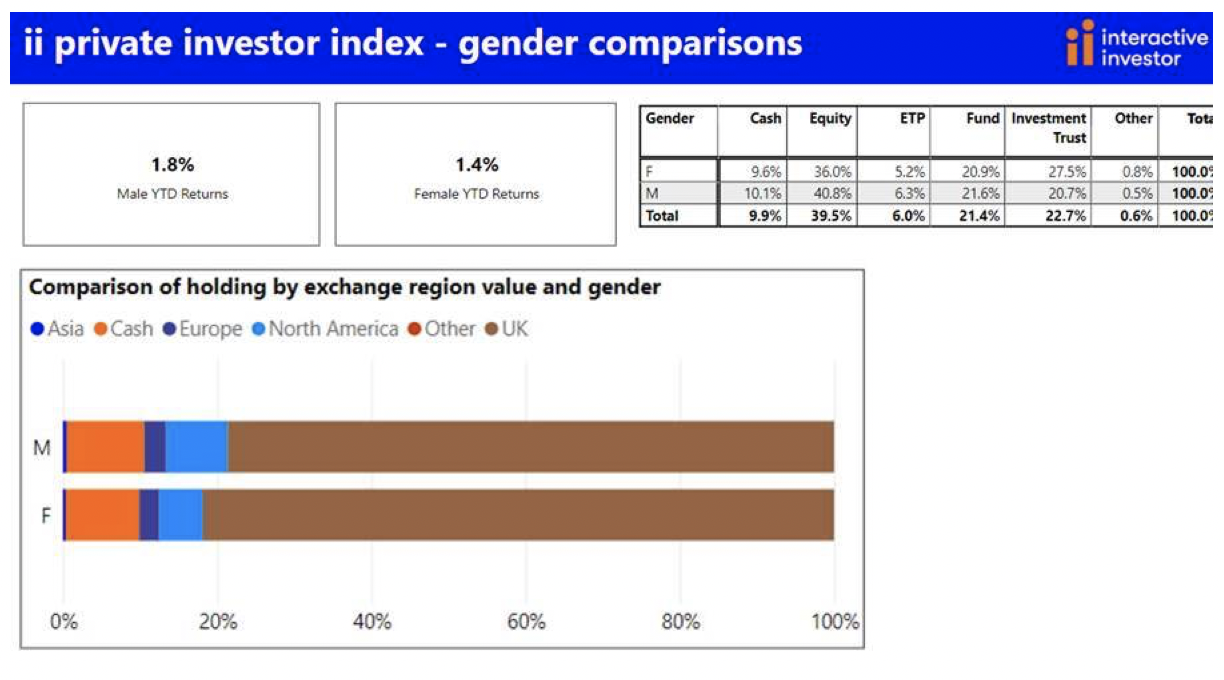Private Investor Index launched by interactive investor
Our new index will offer regular insight into how private investors are faring.
12th January 2021 11:13
by Jemma Jackson from interactive investor
Our new index will offer regular insight into how private investors are faring.

- Younger investors’ portfolios on the interactive investor platform (18 to 24-year olds) saw strongest growth of 8.1% on a median average basis.
- The wealthiest customers on the platform (£1 million+ accounts) made their presence felt with average gains of 8.7%.
- Performance in both groups had highest exposure to investment trusts.
- Active investors (those trading at least twice a month) saw strongest returns (up 6.3%) compared to the average user (up 1.8%).
- Lloyds the most frequently traded equity stock in six out of 12 months of the year.
interactive investor, the UK’s second-largest investment platform for private investors, today launches the ‘interactive investor Private Investor Index’ looking at the full calendar year performance for 2020.
Going forward, the index will start to incorporate longer-term data, with the index updated quarterly, looking at performance by age, gender, region, investment type, wealth and more, providing a unique insight of private investor performance.
The FTSE 100 was down -11.55% on a GBP total return basis in 2020, with the FTSE All Share down -9.82%. interactive investor customers performed significantly better on a median average* basis, up 1.8%. Overseas exposure may well have mitigated some of the losses from the UK. For example, the S&P 500 was up 14.74% last year.
Investment trusts boost returns (for now)
A bigger appetite for investment trusts may have helped drive outperformance for the youngest and wealthiest customers on the platform, boosted by their overseas and alternative assets exposure. It should be noted that in more challenging global markets, gearing (borrowing) means that investment trusts will have a tendency on average to underperform.
Those aged 18 to 24 were up an average of 8.1%, and those with £1 million-plus accounts were up 8.7%. These two groups had the highest investment trust exposure. 18 to 24-year olds had an average exposure to investment trusts of 38% versus an overall average of 23%. Accounts with £1 million-plus also had higher than average investment trust exposure (26%) and lower cash exposure (7% versus an overall average of 9.8%).
While past performance is no guide to the future, according to the investment companies’ team at JPMorgan, 2020 saw the largest ever outperformance of the FTSE All-Share by investment trusts - the FTSE Equity Investment Instruments Index (FTSE EII) produced a total return of 17.8%.
Richard Wilson, CEO at interactive investor, says: “Last year was a year we all hope we never repeat. But whether investors watched on the sidelines or changed their investments as markets played out, we are delighted to report that overall, ii customers performed well. We look forward to providing regular insight into how private investors – the majority of whom manage their own investments - are faring through the good times and the bad.”

Whilethe youngest investors (18 to 24 years) saw their portfolios increase by 8.1% in 2020, this was followed closely by the 25 to 34 age bracket, who achieved returns of 6.9%. This contrasts with the 65+ age group whose investments had fallen by 0.9% - which still was considerably better than the UK market.
Trading Trends
Lloyds Banking Group was the most-frequently traded equity stock in six out of 12 months of the year.
In July, Boohoo was the most-traded stock on the platform, after allegations that it sourced clothes from suppliers in Leicester that had poor health and safety records.
November and December’s top equity trades included healthcare and airline stocks, reflecting the buoyant news of a vaccine and some initial hope that a recovery in the travel industry was imminent.

Active private investors achieve strong returns
Active retail customers on the interactive investor platform, those who trade at least twice a month, grew their portfolios by 6.3%. This compared to an average gain of just 1.8% for all users.
Gender
Male customers slightly outperformed female customers last year (up 1.8% versus 1.4%). This comes despite the fact that women had more investment trust exposure than men (27.5% versus 20.7%). Women had more UK equity exposure than men, which may explain the difference (81.85% versus 78.65% for men), and less North American exposure.

Regional returns
Investors in the Channel Islands came out on top with an average return in 2020 of 4.56%, nearly double that of investors in London (2.94%). Scottish and Northern Ireland investors performed well, with average returns at 3.22% and 2.67%, respectively.

Notes to editors
ii customer performances quoted are median values in order to avoid the influence of outlier performance skewing the data.
**FTSE Index performance, unless otherwise stated, is ii using Morningstar.
These articles are provided for information purposes only. Occasionally, an opinion about whether to buy or sell a specific investment may be provided by third parties. The content is not intended to be a personal recommendation to buy or sell any financial instrument or product, or to adopt any investment strategy as it is not provided based on an assessment of your investing knowledge and experience, your financial situation or your investment objectives. The value of your investments, and the income derived from them, may go down as well as up. You may not get back all the money that you invest. The investments referred to in this article may not be suitable for all investors, and if in doubt, an investor should seek advice from a qualified investment adviser.
Full performance can be found on the company or index summary page on the interactive investor website. Simply click on the company's or index name highlighted in the article.